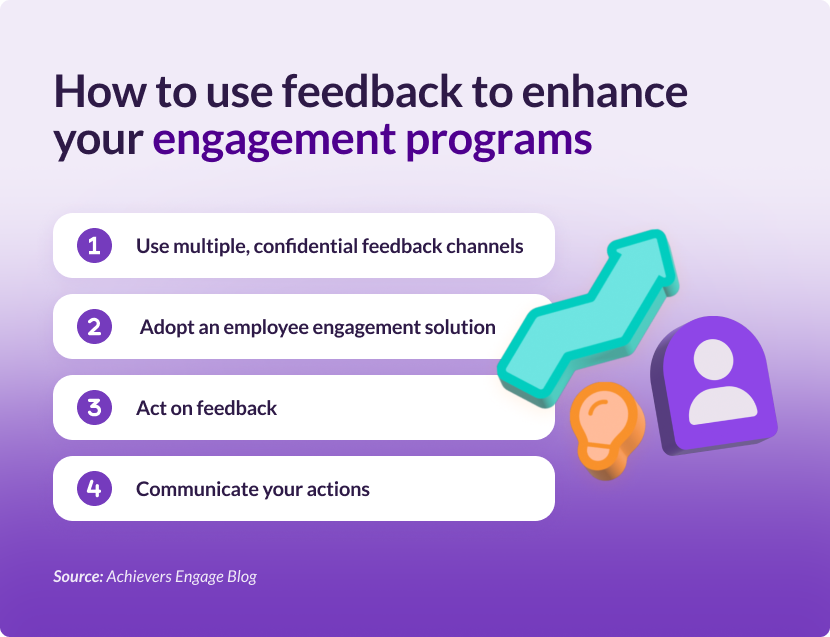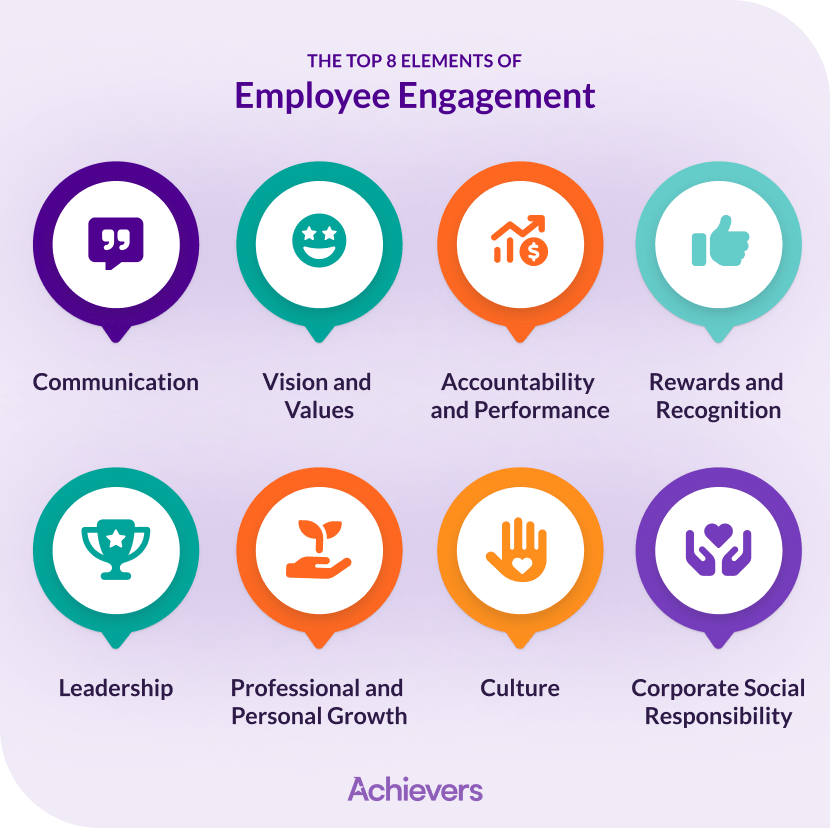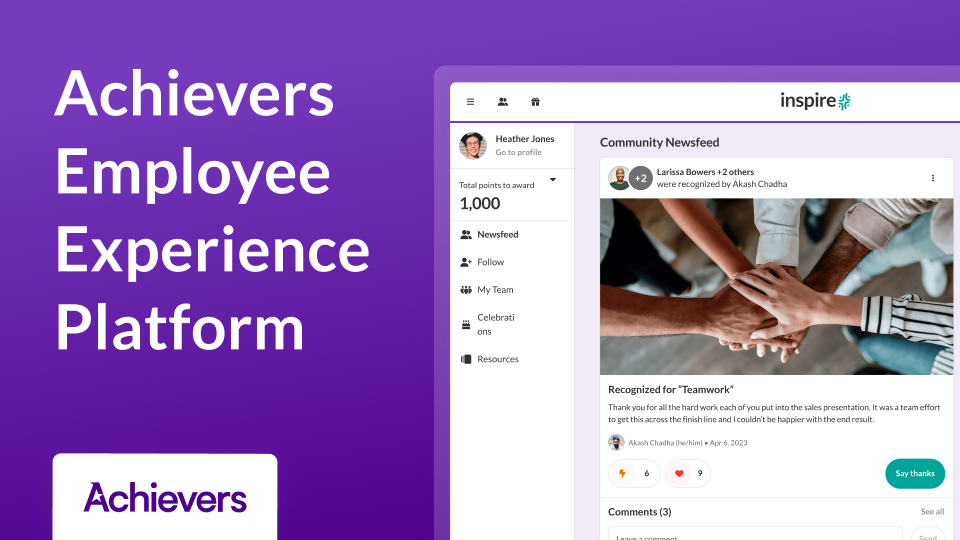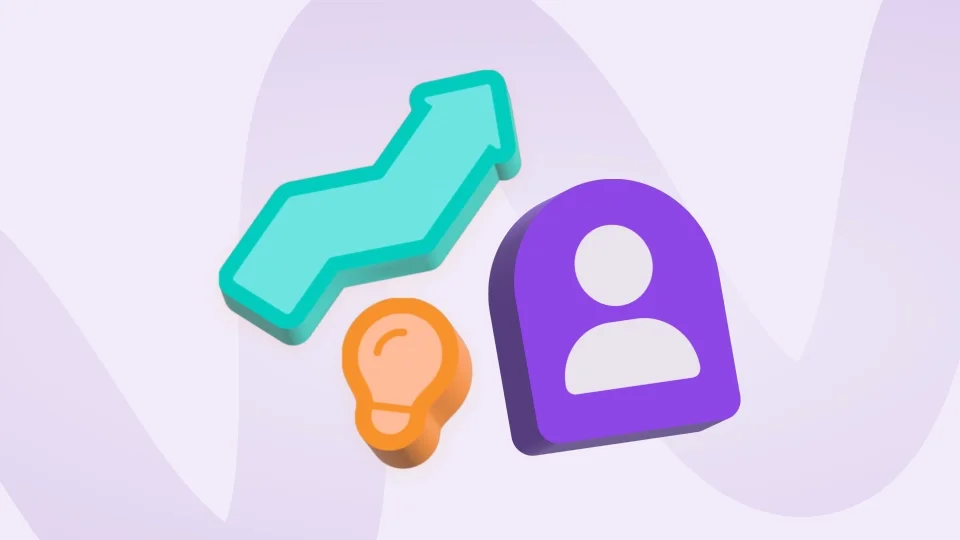Table of contents
As the workplace continues to evolve, 2025 is shaping up to be a pivotal year for employee engagement. Today’s workforce craves more than a paycheck — they want purpose, connection, and recognition. With hybrid work, new tech, and rising expectations, companies must rethink how they keep employees motivated.
The most successful organizations are taking a human-centered approach — building cultures where people feel valued, inspired, and excited to contribute. In this blog, we’re highlighting 12 standout engagement programs that do just that. Ready to raise the bar? Let’s dive in!
12 employee engagement program examples
As work trends shift and employee expectations grow, innovative engagement programs are essential for boosting motivation, satisfaction, and retention. Here are standout examples to help transform your workplace in 2025 and beyond:
1. Recognition programs
Employee recognition programs boost employee engagement by making employees feel valued and appreciated for their contributions. When employees receive regular, meaningful recognition—whether through peer-to-peer shoutouts, manager-led awards, or company-wide acknowledgments — they are more motivated, productive, and loyal. Studies show that companies with strong recognition programs experience higher job satisfaction and lower turnover. A structured recognition program fosters a culture of appreciation, reinforcing behaviors that align with company values and goals.
2. Points-based rewards
Points-based rewards programs give employees tangible incentives for their hard work and achievements. Employees earn points for milestones like hitting performance goals, living company values, or receiving peer recognition, which they can redeem for rewards of their choice. This approach personalizes recognition, making it more meaningful and motivating. By providing flexibility and autonomy in rewards, companies create a culture where engagement is driven by positive reinforcement and individual preferences.
3. Employee volunteer programs
Employee volunteer programs align company values with social responsibility, boosting engagement by giving employees purpose beyond their daily tasks. When employees have opportunities to contribute to causes they care about — whether through paid volunteer days, company-sponsored events, or donation-matching programs — they feel a stronger sense of pride and belonging. These programs foster teamwork, strengthen company culture, and demonstrate that the organization prioritizes impact, leading to increased loyalty and motivation.
4. Flexible work arrangements
Offering flexible work arrangements, such as remote work, flexible hours, or compressed workweeks, enhances engagement by promoting work-life balance. Employees who have control over their schedules experience less burnout, greater job satisfaction, and increased productivity. Flexibility shows trust in employees and acknowledges their personal needs, which boosts morale and retention. Companies that embrace flexible work see higher engagement levels, as employees feel empowered to work in ways that best suit them.
5. Mentorship opportunities
Mentorship programs foster employee growth and engagement by connecting employees with experienced colleagues who can provide guidance, support, and career advice. These relationships build confidence, enhance skills, and create a sense of belonging within the organization. Employees who participate in mentorship programs feel more invested in their roles, knowing they have a clear path for development. Mentorship also strengthens workplace culture by encouraging collaboration, knowledge-sharing, and professional growth.
6. Team-building activities
Engaging employees in team-building activities helps foster stronger relationships, communication, and collaboration. Whether through retreats, problem-solving exercises, or social events, these activities create a sense of camaraderie and trust among employees. When people enjoy working together, they are more engaged, motivated, and productive. A well-designed team-building program breaks down silos, improves morale, and reinforces company values, ultimately leading to a more cohesive and engaged workforce.
7. Wellness programs
Wellness programs support employees’ physical, mental, and emotional well-being, leading to higher engagement and productivity. Initiatives like gym memberships, mindfulness sessions, health screenings, and mental health resources show that a company cares about its employees’ overall well-being. When employees feel their health is prioritized, they are more focused, energized, and committed to their work. Investing in wellness reduces stress, improves retention, and cultivates a positive workplace culture.
8. Charity work
Encouraging employees to participate in charitable initiatives — whether through donation drives, fundraising events, or corporate giving programs — fosters engagement by reinforcing a sense of purpose. Employees feel more connected to their company when they see it making a positive impact on society. Charity work also builds teamwork, morale, and brand reputation, creating a culture where employees take pride in their organization’s values and mission.
9. Onboarding programs
A strong onboarding program sets the foundation for long-term engagement by helping new hires integrate smoothly into the company. Effective onboarding goes beyond paperwork — it includes structured training, mentorship, cultural immersion, and goal-setting. When employees feel welcomed and equipped with the tools they need to succeed, they become more engaged and committed. Companies with comprehensive onboarding programs experience higher retention, faster productivity, and greater employee satisfaction.
10. Employee resource groups (ERGs)
ERGs provide employees with a platform to connect over shared identities, interests, or experiences, fostering inclusion and engagement. These groups offer support networks, professional development, and advocacy opportunities, making employees feel heard and valued. ERGs contribute to a more inclusive workplace culture where diverse perspectives are embraced, leading to greater innovation, collaboration, and retention. Companies that actively support ERGs demonstrate a commitment to diversity, equity, and employee well-being.
11. Employee surveys
Regular employee surveys show that leadership values employee feedback and is committed to improving workplace culture. Surveys provide insights into engagement levels, job satisfaction, and areas for improvement, allowing companies to take meaningful action. When employees see that their feedback leads to real changes, they feel more valued and invested in the organization’s success. A strong survey strategy enhances communication, trust, and long-term engagement.
12. Learning and development opportunities
Continuous learning opportunities keep employees engaged by fostering career growth and skill development. Training programs, leadership courses, tuition assistance, and access to industry certifications demonstrate a company’s commitment to its workforce. Employees who see clear growth paths are more motivated and less likely to seek opportunities elsewhere. By investing in learning and development, companies create a culture of continuous improvement, innovation, and high performance.

How to use feedback to enhance your engagement programs
Collecting and acting on employee feedback is essential for building engagement. Use these strategies to gather accurate input and respond effectively:
- Use multiple, confidential feedback channels: Offer options like pulse surveys to measure sentiment regularly, suggestion boxes for ongoing ideas, and HR chatbots to allow employees to share thoughts anytime anonymously.
- Adopt an employee engagement platform: Use platforms that combine surveys, analytics, and feedback tracking to identify trends and address issues quickly.
- Act on feedback: Tackle employee concerns like workload challenges or team conflicts promptly to show their input leads to meaningful changes.
- Communicate your actions: Share updates about improvements such as new policies, training, or resources implemented based on feedback. Follow-up to confirm these changes meet employee needs.
What makes an employee engagement program successful?
Now that you know what programs to implement, you’ll likely want to know what it takes to make them successful. Employee engagement isn’t just about having the right initiatives in place — it’s about fostering the right environment to support them. From strong leadership to a culture of recognition, several key factors influence motivation, satisfaction, and performance. Here are eight essential components that create a thriving, engaged workforce:

- Communication: Transparent, authentic communication builds trust and helps employees feel heard. Regular updates, open-door policies, and active listening boost alignment, reduce confusion, and strengthen culture.
- Vision and values: A clear mission and strong values give employees purpose. When people see how their work supports big-picture goals, they feel more motivated and connected to the organization.
- Accountability and performance: Clear expectations and consistent feedback drive performance. Regular praise and coaching keep employees motivated, accountable, and focused on growth.
- Rewards and recognition: Recognizing effort — through praise, rewards, or peer shout-outs — boosts morale, reinforces positive behaviors, and increases engagement and retention.
- Leadership: Great leaders inspire through open communication, encouragement, and recognition. Supportive leadership drives innovation, trust, and a culture of empowerment.
- Professional and personal growth: Employees are more engaged when they have opportunities to learn and grow. Mentorship, training, and career development build confidence and boost retention.
- Culture: A positive culture creates belonging and collaboration. When employees feel supported and accepted, engagement, satisfaction, and teamwork thrive.
- Corporate social responsibility: Employees value companies that give back. Ethical practices and community involvement build pride, boost morale, and strengthen loyalty.
The benefits of employee engagement
Implementing effective employee engagement programs doesn’t just create a more enjoyable workplace — it drives real business results. When organizations invest in initiatives like recognition programs, flexible work arrangements, learning opportunities, and more, they cultivate a motivated, committed workforce that fuels long-term success. Here’s how that translates into business success:
- Higher productivity: When employees feel recognized, supported, and connected to company values, they are more focused, efficient, and motivated to perform at their best.
- Stronger company culture: Programs that prioritize recognition, communication, and social responsibility create an environment where employees feel valued and aligned with organizational goals.
- Increased retention: A culture of engagement reduces turnover by fostering professional growth, providing meaningful recognition, and supporting work-life balance.
- Enhanced collaboration: Team-building activities, ERGs, and volunteer programs encourage stronger workplace relationships, improving teamwork and innovation.
- Improved employee well-being: Wellness programs and flexible work arrangements support physical and mental health, reducing burnout and boosting overall satisfaction.
- Greater alignment with company vision: Employees who feel connected to their company’s mission and values are more engaged and committed to driving business success.
- More innovation and growth: Engaged employees are more likely to take initiative, contribute ideas, and seek professional development opportunities that benefit both them and the organization.
- Higher customer satisfaction: A motivated workforce leads to better customer interactions, stronger brand advocacy, and improved business outcomes.
Start building winning employee engagement programs at your company
As we move into 2025, the best workplaces go beyond the basics, creating real connections through recognition, flexibility, growth opportunities, and purpose-driven programs. When employees feel valued and supported, they’re more motivated, productive, and loyal. Investing in engagement isn’t just good for your people — it’s good for business.
With Achievers, you can build a culture of appreciation and connection through industry-leading recognition and engagement solutions. Ready to create a workplace where everyone thrives? Let’s make it happen.



